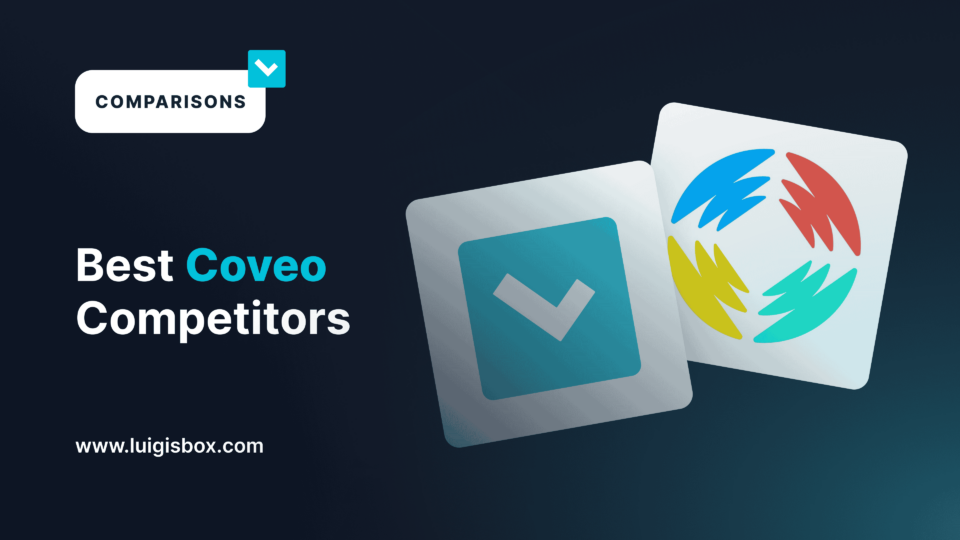- Introduction
- What is an e-commerce search software?
- What should it be able to do?
- Enhancing the search experience
- E-commerce site search examples
- What to consider when choosing the right e‑commerce site search solution
- 8 best e‑commerce site search solutions
- Future trends in e-commerce search technology
- Conclusion
- Frequently asked questions
Introduction
How often do you get frustrated when struggling to find a product on an e‑commerce site because the search box didn’t work how you wanted? Probably quite a few times – and most likely, you left the online store and looked for another, more convenient one.
Your customers are the same. If your search software, instead of making it easier for them to find the products they want, only confuses them or doesn’t give them the results they want, they will simply go to another store. At least, that’s what more than 30% of people do.
That makes a fast and user-friendly e‑commerce search tool an essential part of e‑commerce sites – without which it might be tough to have happy customers coming for more. But which one of the many powerful search engines should you pick?
Well, with our e-commerce experts and product managers, we have prepared a comprehensive article to help you understand what e-commerce search software is, what capabilities it should have, and how to choose the right one for you. We also included tips on the best e-commerce search software on the market.
What is an e-commerce search software?
E‑commerce search software is a search engine with features explicitly designed to help e‑commerce site visitors find the products they are looking for quickly and easily, ultimately improving the overall user experience and increasing the likelihood of conversion. These tools are designed to handle large catalogs of products and deliver fast and accurate search results to enhance the overall shopping experience for users on e-commerce websites.
What should it be able to do?
Basic e‑commerce search tools simply match the keywords from a search query with product descriptions stored in the database. However, modern e‑commerce search software has advanced features that can do far more than that. Here’s the list of the top 7 a modern-day e‑shop should master.
#1 Learn from the data
Thanks to artificial intelligence, search software can learn from the data it has about user behavior to give them more accurate search results. Additionally, AI-powered algorithms, particularly those employing NLP, can better understand the context and provide more relevant results even when the user’s input is less structured or more conversational. Machine learning algorithms can analyze historical search and user interaction data to learn which results are more likely to be clicked, leading to improved relevance ranking.
AI algorithms can, based on past search history, purchase behavior, and preferences, provide personalized search results that match individual user preferences, offering a more tailored and relevant experience. AI algorithms can identify synonyms and related terms, ensuring that search results are not limited to the exact words used in the query. And that’s just part of what they can do.
#2 Adjust filters based on category
Dynamic filters allow users to refine their search results through detailed search filters and facets (product criteria such as color, size, brand, the material used, etc.). Moreover, modern e‑commerce search software provides an option for dynamic filters, meaning the users only see what’s relevant to their query. This prevents them from getting lost in the sea of irrelevant filters.
#3 Autocomplete queries
Autocomplete is a must-have feature in a modern e‑shop. The autocomplete feature provides search results from typing the very first character, which speeds up and simplifies the visitors’ shopping journey and provides instant feedback on their search queries.
#4 Suggest products in autocomplete
Autocomplete can be a super-fast predictor of users’ queries and a powerful merchandising tool. Modern e‑commerce search engines dedicate a place in the autocomplete for, let’s say, the best-selling products to give the shoppers initial ideas of what they might be interested in. Don’t underestimate the power of social proof.
#5 Synonym search
Take into account synonymous words and add them to the search results. For example, when a customer searches for “sweaters,” the software won’t only show results with the word “sweater” but also items with “jumper” or “pullover” in the product description. Implementing synonyms helps increase the chances of customers finding relevant products and improve the customer experience.
#6 Use voice or product image search
Allow shoppers to use voice or product image search to look for relevant products. This improves user experience since customers can search for desired products or content more naturally and efficiently. In addition, voice search makes your website accessible even for people with different disabilities and other problems that prevent their use.
#7 Recognize misspellings
To avoid customers leaving your website, it is necessary to have a search that can recognize the most common misspellings and show the correct product even if the user makes a typo while typing the product name into the search box.
For a more detailed overview of e‑commerce search best practices, read our dedicated blog on this topic.
Enhancing the search experience
With those features, you can quickly enhance the search experience website and mobile users have when using your store. Not only can they look for the products in a way that is most convenient for them (no matter whether they prefer browsing the store through a website or using a voice assistant), but the AI‑powered search feature will also make sure that shoppers get the most relevant results for their search queries.
With 65% of shoppers finding customer experience more important than price, giving them a user-friendly way to browse your e‑commerce store through an AI‑powered site search might be something that brings far more customers to your store.
By giving them tailored product recommendations as they add products to their shopping cart meanwhile, you can make your customers feel like you know exactly what they need and convince them to add something more to their shopping basket. Monete research found that shoppers who got the right recommendations had a 70% higher conversion rate than other shoppers.
When you use an AI‑powered search solution, you can customize the recommendations to your visitors’ every search and then automatically show them relevant products – and on any channel they might be using.
65% of people find customer experience more important than price. (Gartner)
E-commerce site search examples
Advanced site search helps real e-commerce businesses enhance their results. Dive into specific examples with these customer success stories:

average conversion rate
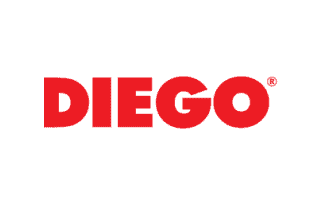
increase in conversion rate

search conversion rate
Example #1: O2
Luigi's Box helped Slovakia's fastest-growing mobile network operator improve their search performance by implementing Luigi's Box Analytics on all O2 sites. Analytics showed results in a short time. The O2 team saw search trends, including phrases with typos and searches without results and clicks.
Thanks to analytics and customized Fixit rules that were implemented in O2 sites, O2 customers easily found what they were looking for and fulfilled their needs. For example, when O2 introduced a new postpaid plan, many customers could not find it because of a missing advanced search feature. The strategic directing of customers toward popular products and services resulted in a remarkable 320% boost in conversion rates.
Example #2: Diego
With a strong presence in Hungary, Romania, and Slovakia, this prominent flooring retailer in the CEE region successfully integrated Luigi’s Box into its online business, achieving remarkable results. Due to the complexity of these languages, Diego faced challenges with manual input of search queries and a need for personalized search results.
Diego decided to implement Luigi’s Box Search and its advanced autocorrect and typo tolerance features that addressed linguistic nuances in Hungarian, Romanian, and Slovak. Implementing Luigi’s Box led to a 5.4% increase in search usage and a 28% rise in conversions within just two weeks. The solution's ability to offer a personalized search experience based on user preferences contributed to a 22% overall increase in conversion rates, enhancing the efficiency and effectiveness of Diego's online platform.
Example #3: Benu
A member of the largest pharmacy network in the EU faced challenges, such as customers struggling to find specific products without entering the exact product name and the search not starting until they entered at least three letters from the name. Luigi's Box provided solutions like recognizing synonyms and advanced autocomplete, showing relevant search results from the first letter.
In a short amount of time, the impact of implementing Luigi's Box was visible. A/B testing revealed a significant 9.49% increase in the search conversion rate, showcasing the effectiveness of Luigi's Box. Even after the successful implementation of Luigi's Box Search, the cooperation between Luigi's Box team, BENU product managers, and PeckaDesign, the e-shop platform supplier, continued, ensuring continuous support and addressing emerging issues.
What to consider when choosing the right e‑commerce site search solution
You can now see that implementing a site search tool dedicated to e‑commerce in your shop will give you a lot of advantages – including having more happy customers who will buy more often and recommend your store to other potential customers.
But how do you choose the right e‑commerce solution with so many options available? Here are a couple of points you should look at especially carefully while browsing and comparing the platforms:
#1 Ease of installation
The time and effort needed to implement the search software platform vary from product to product. If you want to install and set up the platform, you should look for solutions with a quick store integration. Luigi’s Box, for example, needs only one line of code added to your CMS, and you can start using it immediately without needing an IT specialist. For more complex solutions, you might need to hire a dedicated technician.
#2 Ease of use
The search function is meant to make searching for products a breeze for potential customers. To ensure they will be able to find what they want through the search bar, it’s a good idea to test how user-friendly the platform is to use before implementing it. For example, you could check how easy it would be for your potential users to add the search filters to the results or find relevant content, such as FAQ.
#3 Features available
Autocomplete, typo corrections, or personalized suggestions can make your customers’ shopping experience much more enjoyable. At the same time, search analytics features can give you plenty of valuable insights about how to improve your store further. You need to remember, though, that the more features a platform has, the higher the subscription price will be – and there’s no point in paying for a hundred features if you’ll be using only 20. So here, it’s best first to list features the new search software should have and focus on those.
In our earlier article, “How to pick the best search for your E‑shop,” we mentioned a few features that you might find especially helpful when running an online store, so it’s worth looking out for those when comparing different search solutions.
#4 Customization features
To ensure the search software will fit your store design, you should also check and compare the customization features each platform can offer. If the default browser design is difficult or impossible to customize, it might look out of place in your store – and discourage your shoppers from using it.
#5 Customer support
When comparing different apps, you should also check what level of customer support each search software provider can offer, in case you have any problems during implementation or using the platform. For example, how fast can you expect the support team to reply, and through which channels can you reach them (phone, mail, live chat, etc.)? User reviews on platforms such as Capterra, G2, or Trustradius should tell you a lot about the customer service of each search software provider.
8 best e‑commerce site search solutions
Now that we talked about why you should add a search tool dedicated to e‑commerce to your store and what to keep in mind while searching for one, it’s time to look at some of the best website search solutions on the market. We picked eight site search companies that are highly rated on G2 and also appear often in roundup posts about e‑commerce search software – here are they.
#1 Luigi’s Box
Luigi’s Box is an AI-powered search and discovery solution designed for e‑commerce sites. The platform uses machine learning and natural language processing to match the search terms to the relevant products and give personalized product recommendations for each site visitor. Thanks to its ease of use and wide variety of valuable features, Luigi’s Box is often mentioned in “Top search softwares for e‑commerce” roundup lists – in the FinanceOnline roundup, Luigi’s Box even earned the 1st place as the best search solution for e‑commerce.
So let’s look at a few of its key features:
- AI and machine learning
- Voice search
- Dynamic filters
- Business-oriented ranking
- Real-time search analytics and reporting
- Personalized recommendations
Pros
- Luigi’s Box search box can be added to a store with just one line of code and a few clicks. This seamless integration makes the platform ideal for small businesses that don’t have an in-house IT team or companies that don’t have time for long and complicated tool installation.
Cons
- Plug-and-play integrations are only for a few platforms, but Luigi's Box is still easy to integrate via API.
#2 Algolia
Another platform that very often appears in the roundup posts is Algolia. Algolia is a hosted search software that helps e‑commerce store visitors find relevant products immediately and through any channel they need – website, mobile, or voice application. Besides products, the search box can also lead your visitors to find any relevant content type or information they need – blog posts, FAQ articles, Help Desk pages, etc. Here are some of the features worth noting:
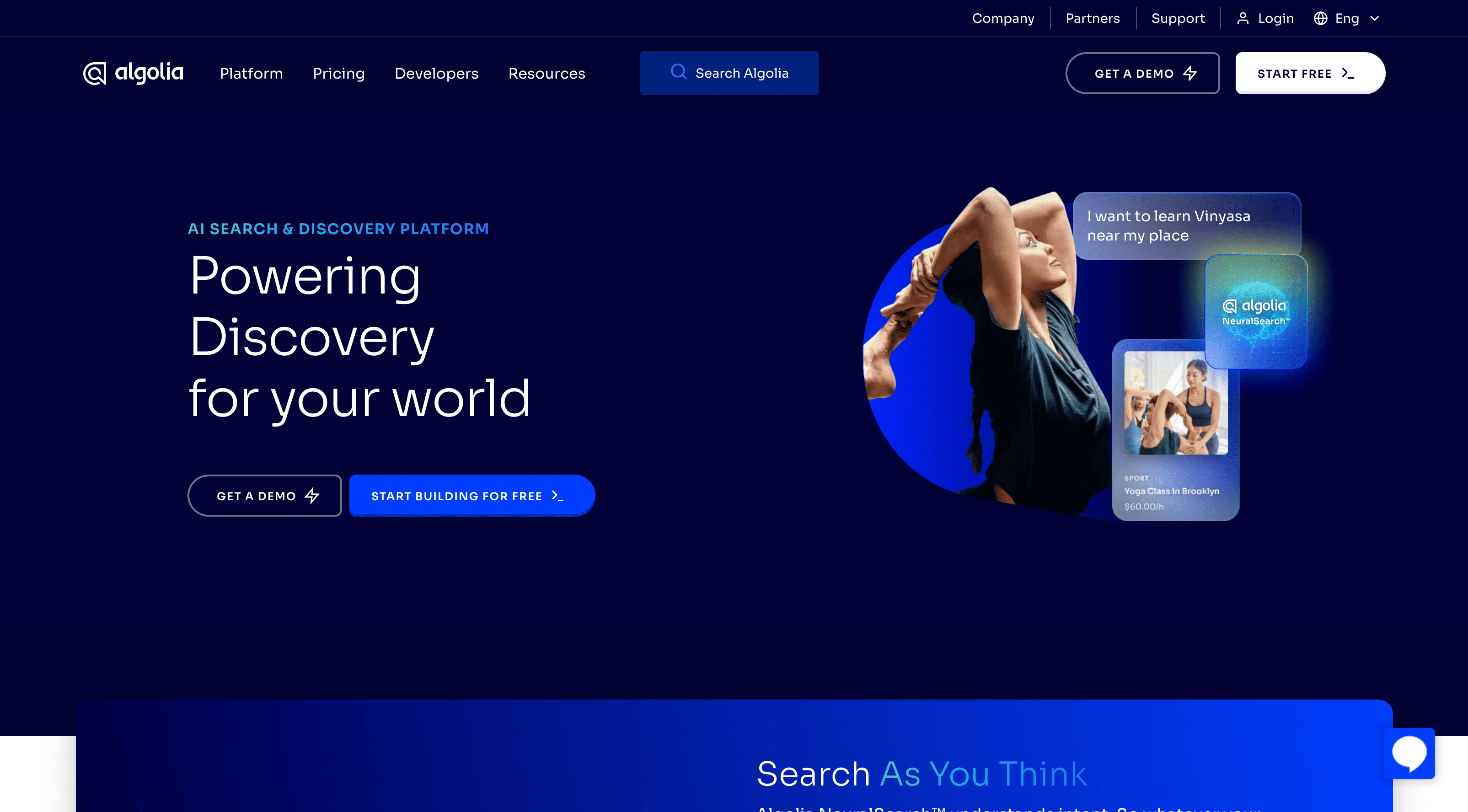
Notable features:
- Full-text search/fuzzy search
- AI/machine learning
- Faceted search
- Search results ranking
- Geo-search
Pros
- According to their website, Algolia’s search terms take only 1 to 20 milliseconds to process. Many reviewers also praise how fast Algolia search software works.
Cons
- A few reviewers mentioned that Algolia’s documentation is incomplete, making working with Algolia confusing for the developers. The platform is pretty complex, so getting an IT team that can run and add changes might also be necessary.
Read more about Algolia’s alternative solutions and how they can help your business.
#3 Elasticsearch
Elastisearch is another popular search platform for product, document, and information searches. Using Elastic’s built-in features for e‑commerce, merchants can optimize and personalize the search results or learn more about how their store performs.
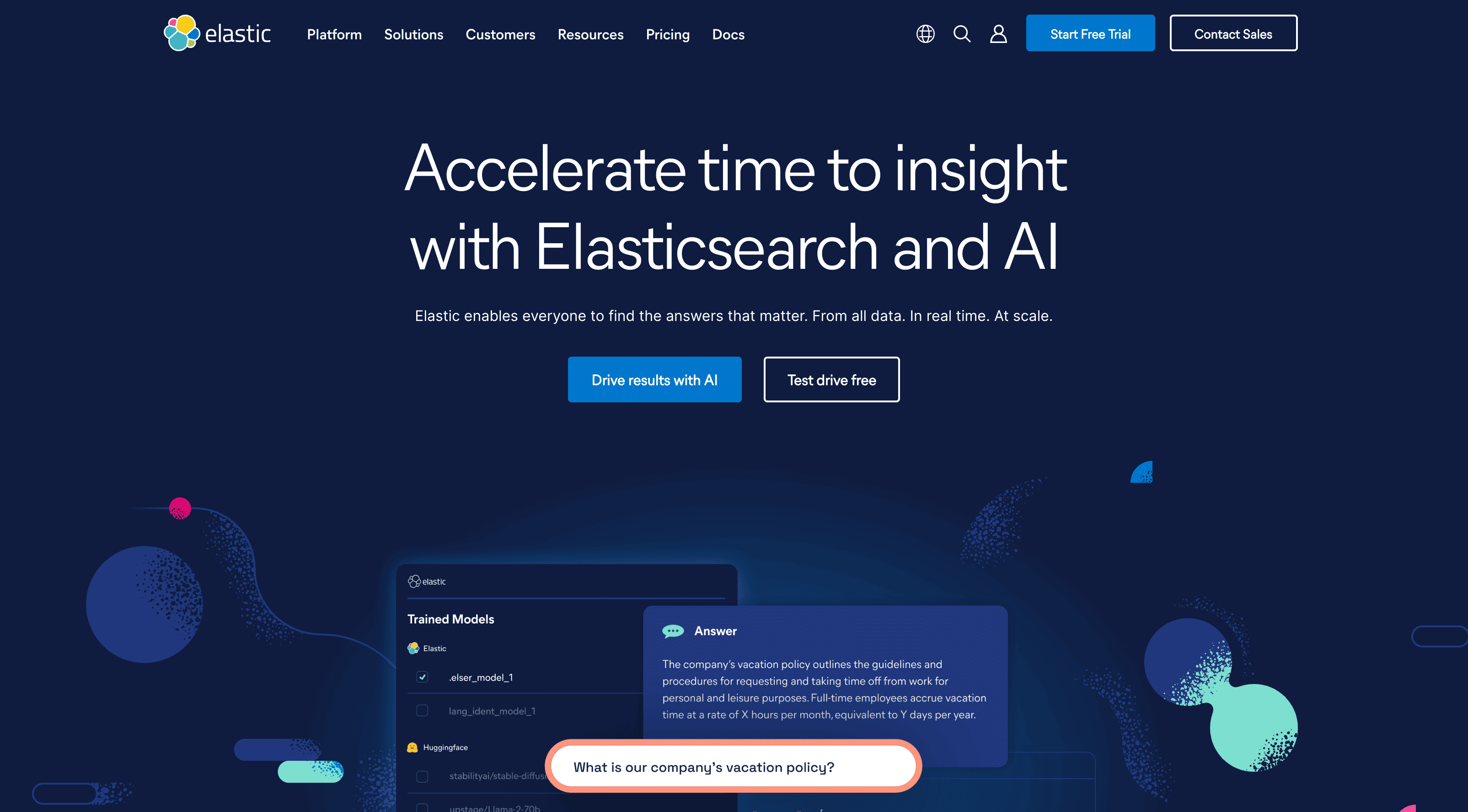
Here are some of its valuable features:
- Full text and fuzzy search
- Full customization
- Results curating
- Indexing of all kinds of content, from product information to documentation
- Relevance scoring
Pros
- Elasticsearch can be used not only for e‑commerce stores but virtually any website or application that needs a reliable search tool – knowledge bases, workplace search boxes, and so on.
Cons
- Without a dedicated IT team, it might be tough to set up and fine-tune the platform settings as everything must be added manually. The same goes for securing the data inside the platform.
Read more about Elasticsearch’s alternative solutions and how they can help your business.
#4 Yext
Yext is a hosted search-as-a-service platform that makes it easier for businesses to guide their potential customers to the right product or content, whether they search for it on the company’s website or through voice assistants. By combining both the available content and additional pages, such as listings or reviews, into one Knowledge Graph, Yext aims to deliver relevant answers whenever customers, employees, or business partners look for them.
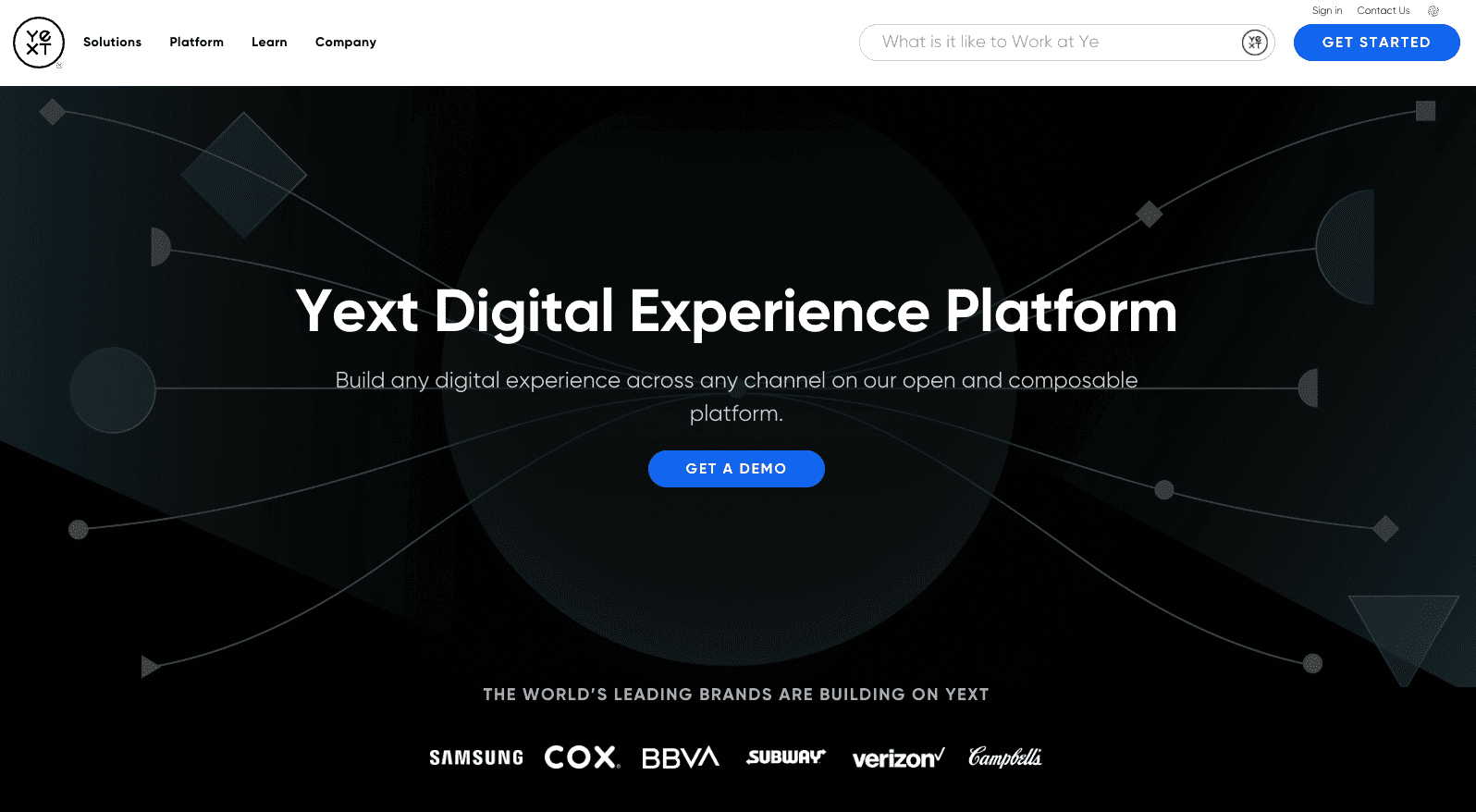
Here are some of its key features:
- User intent pattern spotting
- Natural language processing
- Contextual search
- Real-time analytics
- Content classification
- AI‑powered recommendations
Pros
- Yext has a handy feature through which you can ask search users questions about their product preferences and then guide them to a product that matches their needs. It also has direct integrations with more than 150 digital worldwide services.
Cons
- A few reviewers mentioned that after you use Yext for the listings or content, you must keep the subscription active, or else the listings will revert to their original version. There are some complaints on the platform, often glitching too.
Read more about Yext’s alternative solutions and how they can help your business.
#5 Coveo
Coveo is a software-as-a-service search tool powered by artificial intelligence through which brands can ensure that each customer gets a personalized experience and learn which products perform well and which don’t, thanks to automated insights. The solution can also easily handle large catalogs with millions of products. Some of the features they offer are:
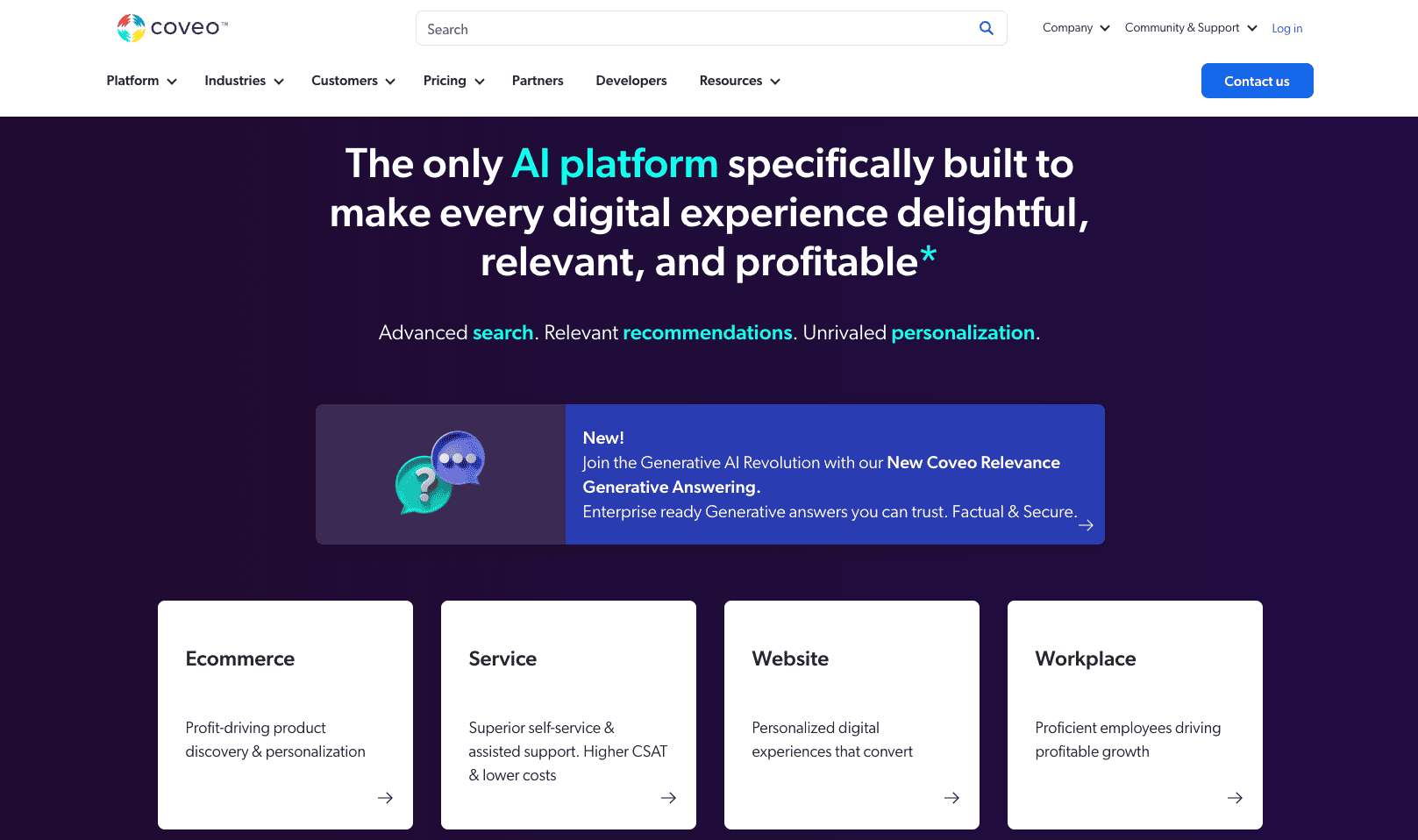
Features
- Faceted search
- Personalized recommendations
- Campaign management
- Search and journey analytics
- Synonyms suggestion
Pros
- The Coveo customer support team is praised in most G2 and Capterra reviews for being quick to answer any questions or issues about the search solutions and helping the users customize the product to their needs.
Cons
- The platform is said to be quite tricky to use, especially for new users. What makes the training harder is that the documentation is pretty vague as well – for example, one reviewer mentioned there are not enough examples of how to use the platform functionalities in practice.
Read more about Coveo’s alternative solutions and how they can help your business.
#6 Doofinder
Doofinder is a versatile e-commerce site search solution designed to enhance the online shopping experience. It offers quick and accurate search results for businesses of all sizes. With real-time indexing, it provides near-instantaneous search results, improving user satisfaction. AI-powered recommendations enable personalized product suggestions, increasing cross-selling opportunities. Doofinder allows easy customization of the search bar and results page, ensuring a consistent and brand-aligned shopping experience.
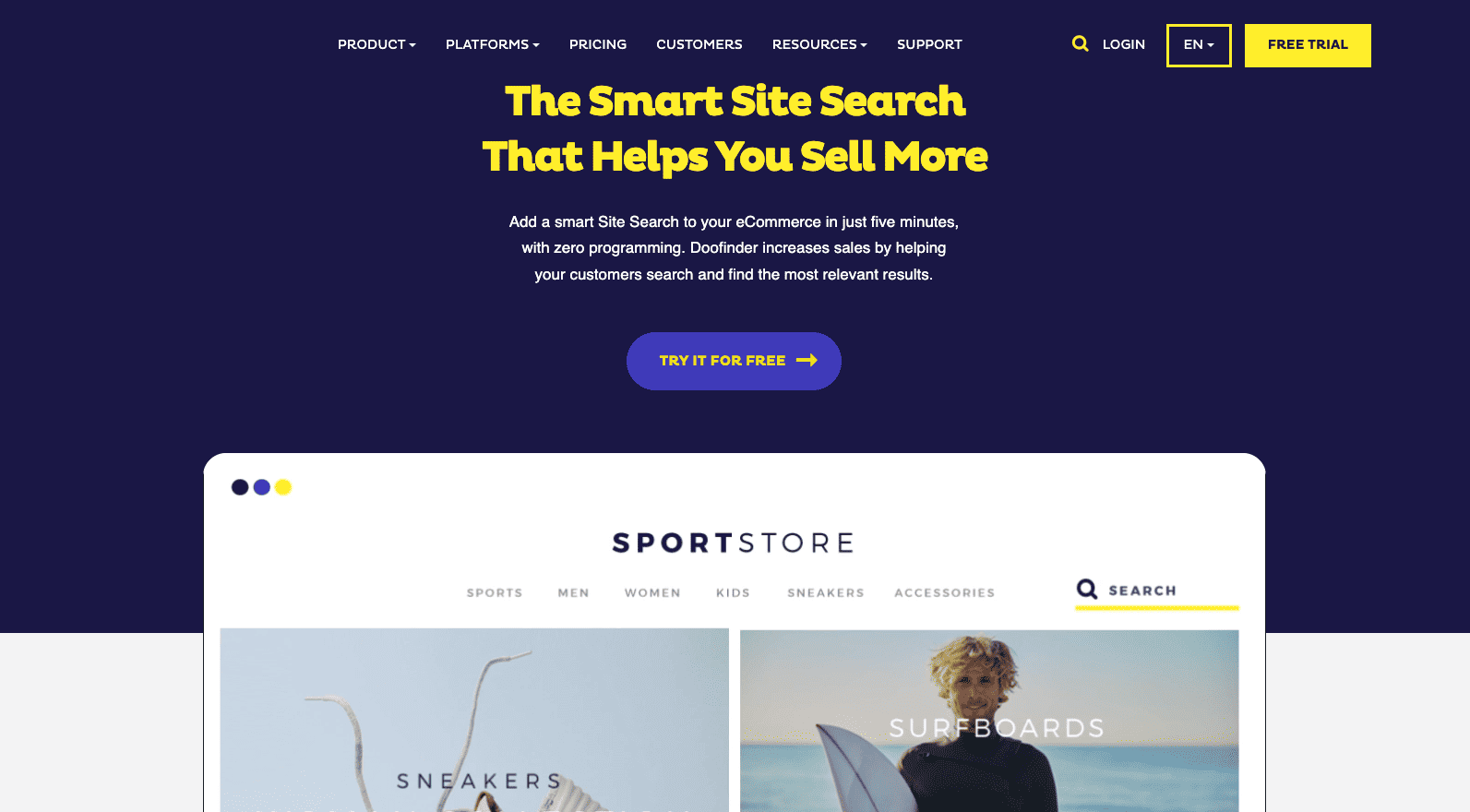
Here are some of its key features:
- Lightning-fast search
- AI-powered recommendations
- Customizable interface
- Advanced analytics
- Mobile optimization
Pros
- Doofinder offers fast search and easy customization, resulting in improved user engagement.
Cons
- Some users have reported that the pricing can be on the higher side for small businesses.
Read more about Doofinder’s alternative solutions and how they can help your business.
#7 Searchspring
Searchspring is a user-centric e-commerce search solution that leverages AI to provide personalized and relevant search results, enhancing the overall online shopping experience. This platform is known for its machine learning-driven search capabilities, ensuring that customers receive search results tailored to their preferences. Searchspring’s faceted navigation simplifies the search refinement process, allowing users to filter and find products with ease.
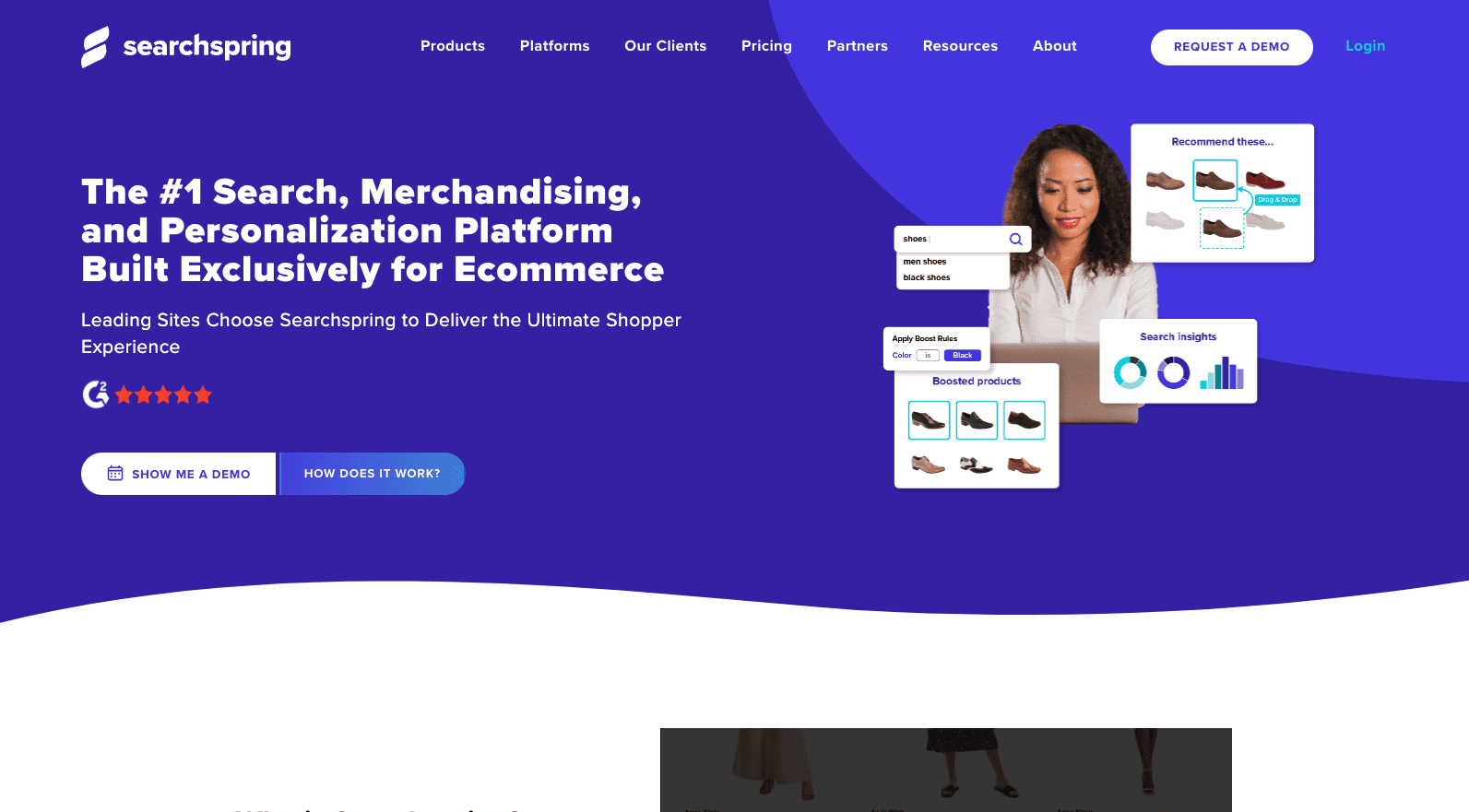
Some notable features of Searchspring are:
- Semantic search
- Faceted navigation
- Merchandising tools
- Analytics dashboard
- Autocomplete
Pros
- Searchspring is praised for its excellent customer support and AI-driven search capabilities, which lead to higher conversion rates.
Cons
- Some users find the initial setup process a bit complex, and pricing may not be budget-friendly for small businesses.
Read more about Searchspring’s alternative solutions and how they can help your business.
#8 Bloomreach
Bloomreach is a powerful e-commerce search and personalization platform designed for large enterprises. It offers advanced machine learning algorithms that power personalized product recommendations and search results. One of its strengths is its seamless integration with content management systems, providing a holistic shopping experience that combines product data with content-driven marketing strategies. Bloomreach is highly scalable, making it a good choice for large e-commerce businesses with complex needs.
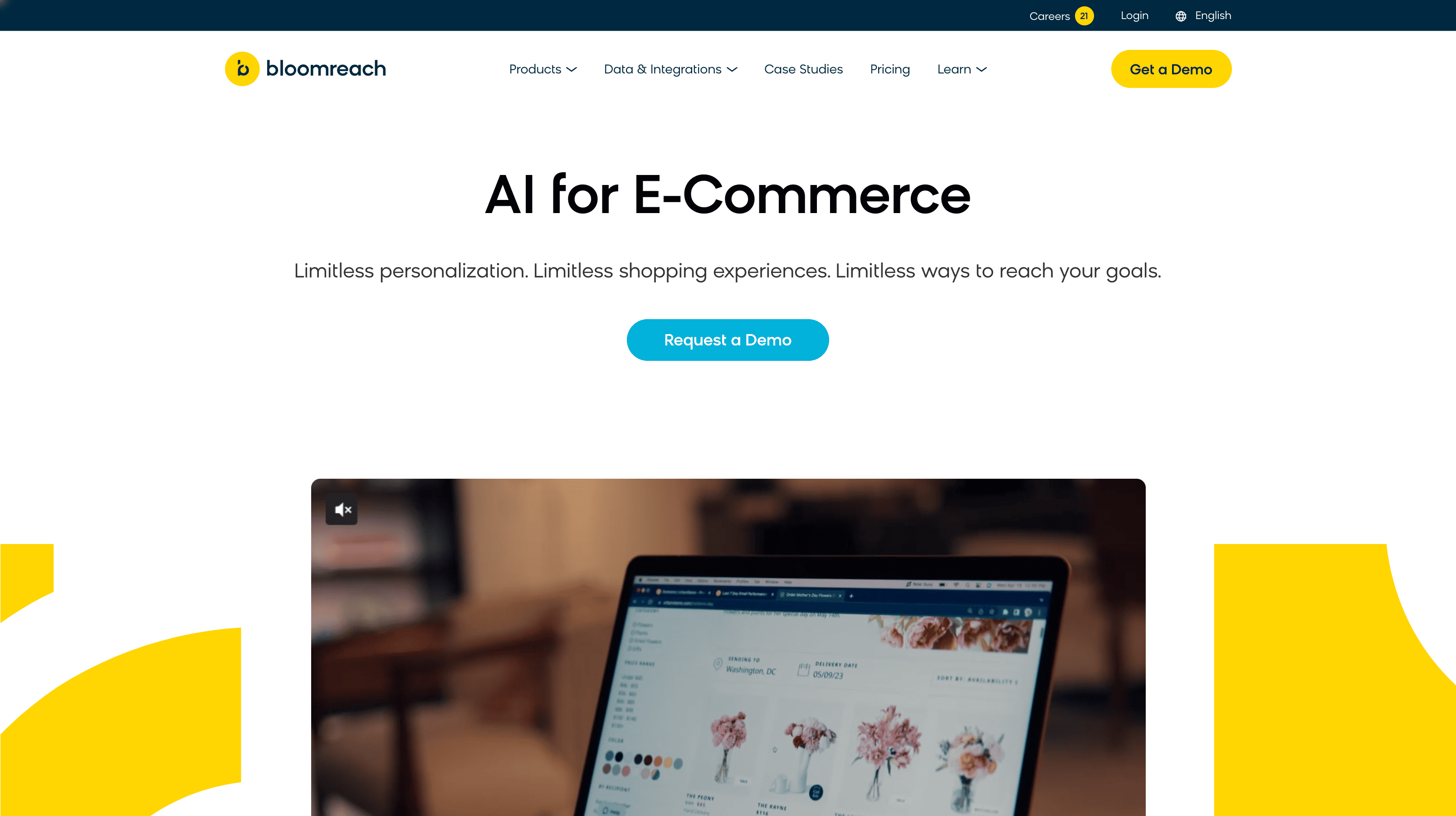
Some of its key features are:
- Machine learning algorithms
- CMS integration
- Scalability
- A/B testing
- Multilingual support
Pros
- Bloomreach is a good choice for enterprises seeking advanced personalization and scalability.
Cons
- The platform's high cost and complexity may not be suitable for small or mid-sized businesses. Additionally, some users have reported longer implementation times.
Read more about Bloomreach’s alternative solutions and how they can help your business.
Future trends in e-commerce search technology
As online shopping is on the rise and represents a stable part of the future of shopping, you should pay attention to the technologies and trends that will improve the user experience and help your online stores reach new heights. We have selected five that will transform the future of e‑commerce, and therefore, you should definitely know about them.
Vector search
Vector search is an ML technique that leverages mathematical representations of data, known as vectors, to find similar items. This technique is mainly used by recommendation systems and for image and text retrieval. Thanks to its ability to go beyond mere keywords and understand product features and nuances, it delivers faster and more relevant search results even on large and varied data, better product recommendations, and an altogether more satisfying customer journey.
Neural search
Neural search is another advanced ML technique that will greatly impact e-commerce search. By leveraging artificial intelligence, the system identifies connections between user interests, and current and past search queries, ensuring search results are more accurate and relevant.
E-commerce platforms can also benefit from its capability to work with various data types, such as text, images, videos, and audio, reduce manual search maintenance, and automatically adjust personalized queries, leading to improved recommendations, boosted sales, and enhanced customer satisfaction.
Headless architecture
The popularity of headless architecture in online stores is on the rise. Thanks to its ability to separate the front-end and back-end processes, headless architecture enables businesses to offer a cutting-edge technological experience.
This leads to reduced IT development costs, better flexibility, scalability, customization capabilities, and responsiveness, allowing businesses to easily create and change any part of their storefront. The headless approach also empowers e-commerce businesses to deliver highly personalized experiences, achieve faster page load times, and enhance overall user satisfaction.
Image recognition
Another significant trend in e-commerce that is highly beneficial, especially for the fashion and home decor industry, is image recognition. With image recognition, your customers can use images to search for similar or related items and enjoy a more personalized and intuitive shopping experience.
Thanks to AI, image recognition automatically identifies and categorizes objects in images, making e-commerce more visually and consumer-centric. Implementing this technology helps you enhance product discovery and minimize search friction and search time, ultimately optimizing cross-selling opportunities.
Natural language processing
Last but not least, Natural language processing (NLP) is another ever-evolving field in e-commerce search. Utilizing NLP, customers can search for products using natural, conversational language since this technology enables computers to understand and process human language in written and spoken forms.
This leads to a simplified search process and the ability to find the desired items, enhanced search accuracy, increased user satisfaction, and improved sales. As NLP matures and integrates with other AI technologies, it becomes more sophisticated, leading to online shopping becoming as natural as asking a knowledgeable sales assistant at a physical store.
Conclusion
The search bar is often the first thing visitors use when they visit your online store. If they can quickly find the specific products they want or get recommendations that match their preferences, they are much more likely to add a product to the cart and purchase.
And that is what an e‑commerce search software is created for – to guide your website visitors to the most relevant product or nudge them to make an additional purchase with personalized recommendations.
We mentioned a few site search engines you might want to have a closer look at in this article. So take a free trial to test them out and ensure to find the site search tool that fits your e‑commerce store ideally.
Frequently asked questions
How to implement e-commerce search on the website?
Implementing the right e-commerce search solution on your website consists of several steps. First, choose the most suitable solution for your needs and preferences, integrate the chosen search platform into your website, implement features, optimize for mobile devices, monitor and optimize performance, personalize, and last but not least, test.
Following these steps, you can create a powerful e-commerce search functionality that takes your e-commerce store to another level.
How to improve my e-commerce search?
There are several best practices to consider when you want to improve your e-commerce search:
- search bar visibility
- autocomplete/autosuggest feature
- relevant product or content suggestions
- ability to work with typos, slang, synonyms
- product ranking and relevance
- analytics
- personalization
- and more.
To learn more about how to improve your e-commerce search, read our blog 15 E-Commerce search best practices to look out for.
What is the best e-commerce search engine on the market?
According to review portal G2, the best search engine solutions are Agolia, Doofinder, Searchspring, Yext, and Luigi’s Box. You should consider factors such as capabilities, speed, integration, customization, analytics, and price to choose the best one for you.
Barbora does magic with words in Luigi's Box as a product marketing specialist. She got into writing while studying at university as a volunteer for various civic associations. Besides being part of Luigi's Box marketing team, she co-organizes the TEDxBratislava conference, where she cares about marketing and PR.
More blog posts from this author














